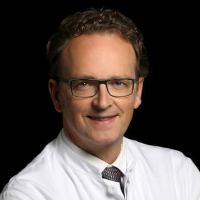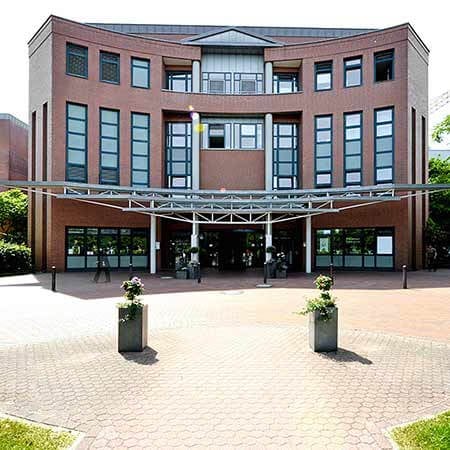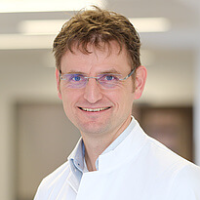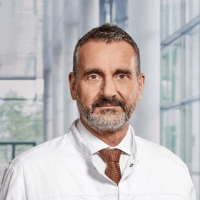Surgical treatment Without the Heart-lung Machine for Congenital and Acquired Heart Defects treatment
Treatment prices are regulated by national law of the corresponding countries, but can also include additional hospital coefficients. In order to receive the individual cost calculation, please send us the request and medical records.

Department of Cardiothoracic Surgery
According to the Focus magazine, the Department of Cardiothoracic Surgery ranks among the top German medical facilities specializing in the surgical treatment of diseases of the cardiovascular system and lung cancer! The department offers the full range of surgical services for the treatment of diseases of the cardiovascular system, respiratory tract, including heart and lung transplantation, artificial heart implantation. The therapeutic options include aortic surgery, coronary artery bypass grafting, transplantation surgery, surgical treatment of heart rhythm disorders (arrhythmias), minimally invasive surgery, surgical treatment of the heart valves, including reconstructive interventions. All operations are performed using state-of-the-art technology and in accordance with the current recommendations of professional societies.






Department of Cardiac Surgery
The Department of Cardiac Surgery provides a full range of surgical treatment in its area of specialization. Special emphasis is placed on heart valve repair and replacement surgery, coronary artery bypass grafting, thoracic aortic surgery, adult congenital and acquired heart disease surgery, pacemaker and defibrillator implantation, and artificial heart implantation for severe heart failure. Many heart operations are performed using minimally invasive techniques, which has a positive effect on the healing of the surgical wound. Minimally invasive cardiac procedures also reduce surgical risks and contribute to a rapid recovery of the patient in the postoperative period. Surgical treatment of cardiac pathologies is performed in advanced operating rooms equipped with the latest technology. The cardiac surgeons of the department successfully perform routine and complex surgical procedures, saving the lives of thousands of patients. The specialists work in accordance with current clinical protocols and follow the recommendations of the German Society for Thoracic and Cardiovascular Surgery (DGTHG).


Department of Cardiothoracic Surgery and Vascular Surgery
The Department of Cardiothoracic Surgery and Vascular Surgery provides effective surgical treatment for diseases of the heart, respiratory system, and blood vessels. The team of cardiac surgeons operates on patients with heart valve pathologies, coronary heart disease, heart failure, and heart rhythm disturbances. In the field of thoracic surgery, the key focus is on the surgical removal of lung tumors and lung metastases. The specialists in this area also perform surgery to repair chest wall deformities. In the field of vascular surgery, interventions for abdominal and thoracic aortic aneurysms are most often performed here. The department's vascular surgeons are also exceptionally competent in the treatment of peripheral occlusive arterial disease. A great advantage for the department's patients is that almost all surgical interventions are performed using minimally invasive techniques, so there is no need for a long postoperative recovery. The department's operating rooms are equipped with state-of-the-art technology. This allows for effective and safe treatment. The priority is always personalized medical care for patients.






Cardiac surgery to eliminate congenital heart defects and acquired heart disease can completely get rid of symptoms and avoid arrhythmias and heart failure. This surgery provides good results that last for many years, and possibly for a lifetime. Doctors perform most operations on the open heart, using a heart-lung machine. In many cases, however, doctors can cope without a heart-lung machine, thereby reducing the risk of complications.
If you have been diagnosed with a heart defect, you can undergo your surgical treatment abroad to rely on the highest level of medical care. Whenever possible, doctors will perform surgery or a minimally invasive procedure without the use of a heart-lung machine, although it is not possible to do so in all cases. You can choose a medical care program at the best price on the Booking Health website.
Content
- Why is a heart-lung machine necessary for congenital and acquired heart defects?
- Benefits of the treatment of congenital heart defects and acquired heart diseases without the use of a heart-lung machine
- Where to undergo your surgical treatment for heart disease without the use of a heart-lung machine?
Why is a heart-lung machine necessary for congenital and acquired heart defects?
A heart-lung machine is a device that replaces a person's heart and lungs during surgery. It takes blood from the body, saturates it with oxygen, and returns it.
With the help of a heart-lung machine, a person can do without the work of the circulatory system for a long time. After the device is connected, blood flows around the heart. A doctor can therefore stop the blood flow through it, open the heart cavity, and perform any manipulations (implant an artificial heart valve, close atrial septal defects, close ventricular septal defects, etc.), even if the surgical procedure takes several hours.
The world's first surgery with the use of a heart-lung machine was performed in 1953 to close an atrial septal defect. The first devices caused many complications and were difficult to operate. Modern devices that are used abroad minimally injure blood cells and proteins and also maintain an optimal gas composition of the blood, which helps to avoid oxygen starvation of organs and tissues as well as the accumulation of toxic metabolic products. But even the most advanced devices increase the risk of complications. Therefore, whenever possible, doctors tend to do without the use of heart-lung machines.
Is it possible to perform surgical treatment without the heart-lung machine for congenital and acquired heart defects? Yes, sometimes surgeons can refuse to use the device during surgery. But basically, the heart-lung machine is still needed. It is required in all cases where doctors must open the cavity of the heart.
If the opening of its cavity is not required, the heart-lung machine will not be involved in the treatment of congenital and acquired heart defects. Cancellation of the device is possible if:
- a surgical intervention is performed not on the heart but on large blood vessels;
- doctors enter the heart from inside the blood vessels, not through an incision in the wall of the heart (an endovascular approach);
- a transcatheter thoracoscopic approach is used: doctors enter the heart through a puncture in the chest.
Thus, not all but some congenital and acquired heart defects can be cured without using heart-lung machines. Among the acquired defects, an endovascular technique is most often used to treat aortic valve stenosis, and mitral insufficiency is less commonly treated in this way. Mitral valve prolapse can be repaired with minimally invasive surgery through punctures in the chest to implant artificial chords, which are the strings that hold the heart valve leaflets.
Many congenital heart defects can be treated with endovascular techniques or through chest incisions, but without the use of the heart-lung machine. Surgeons at advanced Cardiac Surgery Centers also perform robot-assisted operations through short incisions between the ribs. This is how a patent ductus arteriosus, ventricular septal defects, atrial septal defects, partial anomalous pulmonary venous drainage, and coarctation of the aorta are treated.
Doctors often perform endovascular procedures to close ventricular and atrial septal defects. These defects are closed with an occluder. If its placement is impossible, even large defects can be closed using a minimally invasive thoracoscopic operation, which is performed abroad using the da Vinci surgical system without the heart-lung machine.
Benefits of the treatment of congenital heart defects and acquired heart diseases without the use of a heart-lung machine
The main advantage of not using a heart-lung machine is that patients can avoid a number of complications that may occur even with the use of state-of-the-art equipment.
The mechanisms of adverse effects of heart-lung machines on the body are as follows:
- mechanical damage to blood cells;
- start of inflammatory processes;
- high blood oxygen levels;
- blood dilution;
- blood cooling is possible;
- non-pulsatile flow that violates the constancy of homeostasis.
When using a heart-lung machine, a systemic inflammatory response syndrome may develop. It is manifested by fever, dysfunction of the heart, lungs, and kidneys, and sometimes neurological disorders.
These risks are minimized at modern hospitals abroad. Modern heart-lung machines use mini-circuits without any cardiotome reservoirs, which reduce tissue damage. New types of oxygenators help maintain the normal gas composition of the blood and almost do not injure its cells. In recent years, leukodepletion (reducing the number of leukocytes) and ultrafiltration techniques have also begun to be applied.
Despite all these advances, it is still best to avoid the use of heart-lung machines if possible. Surgical treatment of heart defects can indeed sometimes be carried out without using the heart-lung machine. However, for the repair of most heart defects with open surgical techniques, the heart-lung machine is necessary.
Where to undergo your surgical treatment for heart disease without the use of a heart-lung machine?
You can travel abroad to treat ventricular septal defects, atrial septal defects, or other heart defects with surgery without the use of a heart-lung machine. Surgeons in developed countries perform modern types of operations, including minimally invasive ones that help cure most heart defects.
The advantages of treatment abroad include the following:
- whenever possible, doctors perform surgery on a beating heart without using a heart-lung machine;
- endovascular procedures are common, which allow for the elimination of many congenital and acquired heart defects without any chest incisions from inside the blood vessels;
- minimally invasive thoracoscopic interventions are performed through short incisions in the chest;
- at many large hospitals, surgical treatment of heart disease is carried out using the da Vinci surgical system;
- treatment abroad is provided with a minimal risk of complications;
- good and long-term surgical outcomes with a low risk of the need for repeat cardiac surgery.
You are welcome to use the Booking Health service to make an appointment for your treatment abroad, find out the cost of treatment, and compare prices at different hospitals. Our website presents the best Cardiac Surgery Hospitals in the world. When you select a medical care program through Booking Health, the cost of treatment will be lower for you. Prices for medical services at foreign hospitals are reduced due to the absence of taxes for foreign patients. The initial cost of treatment will not increase after the start of your medical care program, even if there is a need for additional medical procedures, as insurance will cover the costs.
Medical tourism agency Booking Health will take care of all the arrangements for your treatment abroad at one of the world's best hospitals. Our company's employees will help you select a hospital, contact the hospital administration, and make an appointment on your preferred dates. They will also book a hotel room and airline tickets, translate your medical documents, and arrange your transfer from the airport to the hospital. After the completion of your treatment program, they will take care of your return transfer from the hospital to the airport.
Authors:
The article was edited by medical experts, board-certified doctors Dr. Nadezhda Ivanisova and Dr. Vadim Zhiliuk. For the treatment of the conditions referred to in the article, you must consult a doctor; the information in the article is not intended for self-medication!
Sources:
ECR - European Cardiology Review

